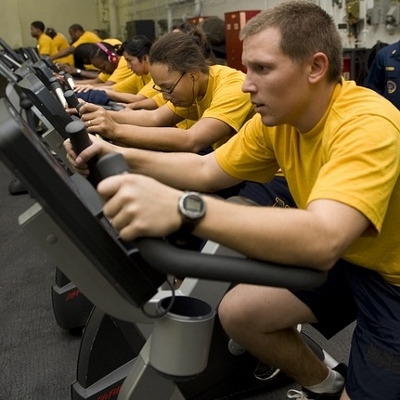 If there’s one guideline to live by in the world of fitness and health, it is that moderation is key. The notion is easy enough to understand when it comes to nutrition. There is definitely such thing as too much of a good thing with regard to diet; eating one or two bananas a day can be beneficial for a person, but eating 30 a day will probably do more harm than good. However, sometimes this concept can be more difficult to grasp with regard to training. It’s common for a runner to believe that training harder will always lead to faster times, but that’s not always the case.
If there’s one guideline to live by in the world of fitness and health, it is that moderation is key. The notion is easy enough to understand when it comes to nutrition. There is definitely such thing as too much of a good thing with regard to diet; eating one or two bananas a day can be beneficial for a person, but eating 30 a day will probably do more harm than good. However, sometimes this concept can be more difficult to grasp with regard to training. It’s common for a runner to believe that training harder will always lead to faster times, but that’s not always the case.
For example, many runners believe that if 30 miles a week helps them improve their 5k time, then running 40 miles a week will make them even faster. The truth is: it might, it might not. If you’re not able to get in the fuel and the sleep to sustain increases in efforts, the extra effort might hurt you, rather than help you. Some runners will find it baffling, when they increase their training and find that it has an opposite effect on their workouts or races: everything feels more difficult, even when they return to a pace that was once comfortable. When extra training seems to do more harm than good, the likely culprit is overtraining. Are you overtraining? Here are a few common signs:
- Excessive fatigue – As described above, you might try a workout that you’ve been perfectly capable of doing in the past and find that it is suddenly a major struggle. Even maintaining your regular run pace feels difficult, and your legs feel heavy.
- High heart rate – In order to know if your heart rate is high, you have to know your baseline heart rate. It can really pay off to take your heart rate on a daily basis. Take it the same time and same way every day to reduce variability from other factors. If your heart rate jumps up 5-10% higher than your typical number, it’s a sign that your body could use a breather.
- General pain and/or sickness – A few aches and pains are natural, especially after a hard workout or long run. However, if the aches are persistent and happening on easy days when you wouldn’t expect them, it could be a sign that there’s something afoot. You might also find yourself with a cold that doesn’t seem to go away.
The solution to overtraining is simple, but not something most runners want to hear: take a break. If you nodded along to the above examples of overtraining, it’s probably time to take a few days to cross train or simply not do any exercise at all. Wait until your heart rate returns to its normal level, or until you simply feel better. Ignoring the signs of overtraining can lead to more serious issues such as stress fractures. A few days off is certainly better than more than a few weeks off.





